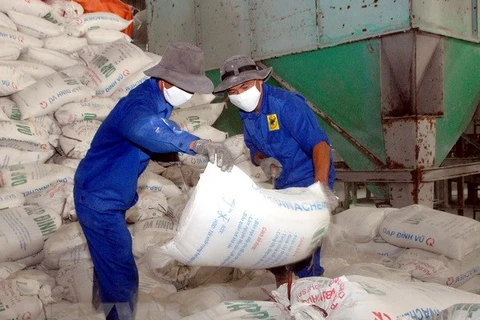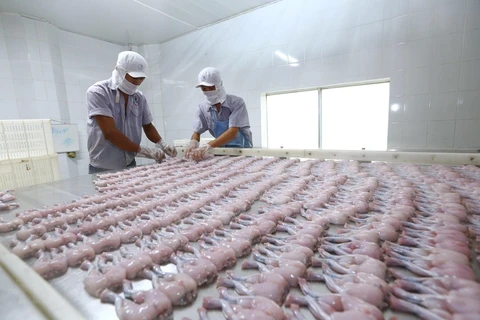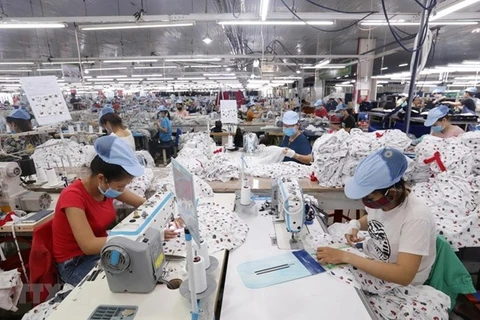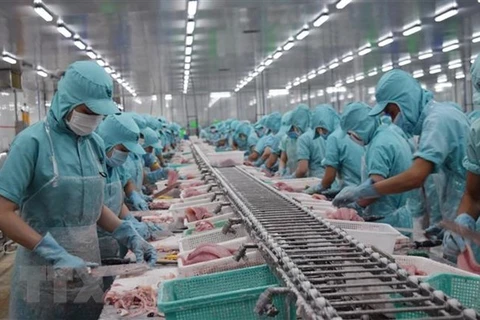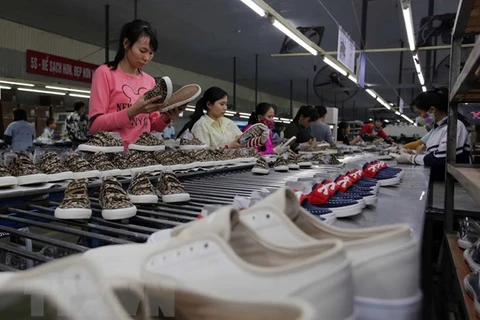 The EVFTA is hoped to create opportunities for Vietnamese businesses to diversify markets and regain growth momentum (Photo: VNA)
The EVFTA is hoped to create opportunities for Vietnamese businesses to diversify markets and regain growth momentum (Photo: VNA) Hanoi (VNA) - The EU-Vietnam Free Trade Agreement (EVFTA), to take effect shortly, is expected to make up for some of the losses Vietnam’s economy incurred during the COVID-19 pandemic, according to insiders.
The Ministry of Industry and Trade (MoIT) said that amid a global economic crisis caused by the coronavirus outbreak, the EVFTA will play an important role in the recovery of the local economy.
Echoing this, many experts said that although growth is unlikely to reach this year’s target, the trade deal with the EU will help buffer the downturn.
They also believe the agreement will create opportunities for businesses to diversify markets and regain growth momentum.
Vietnamese companies have long struggled to gain a foothold in the EU as they face rivals from countries with developed industries, especially China, and its product prices are usually 10-20 percent higher than those of identical goods from other countries.
The EU is the world’s second-largest importer, purchasing about 2.338 trillion USD worth of goods from overseas annually, only 2 percent of which is from Vietnam. Just over 42 percent of Vietnam’s exports to the EU, meanwhile, benefit from zero-percent tariffs under the Generalised System of Preferences.
Given this, and with strong commitments made to market opening and the elimination of almost all import tariffs in the EVFTA, the opportunities for Vietnam to bolster its exports are huge, especially for commodities where it possesses strengths, such as textiles and garments, leather and footwear, agricultural and fisheries products, and wooden items, experts have noted.
A recent study indicates that the trade deal will help raise shipments to the EU by some 20 percent in 2020, 42.7 percent in 2025, and 44.37 percent in 2030. Vietnam’s imports from the EU will also increase but at a slower pace than exports, at about 15.28 percent in 2020, 33.06 percent in 2025, and 36.7 percent in 2030.
The EVFTA will help boost Vietnam’s GDP by an average of 2.18-3.25 percent in 2019-2023, 4.57-5.3 percent in 2024-2028, and 7.07-7.72 percent in 2029-2033.
Local producers will benefit a great deal from high-quality input materials, machinery, and technology from the EU at more reasonable prices, which will subsequently help promote productivity and product quality. Imports of goods and services from the bloc will also generate competition, encouraging Vietnamese businesses to work harder to improve their competitiveness.
Experts added that new value chains between Vietnam and the bloc will take shape under the EVFTA. A more open and more favourable investment climate will also be promoted, attracting greater FDI from the EU, particularly to sectors such as services, finance, automobiles, processing and manufacturing, information technology, high technology, and food processing.
At the same time, the pact’s requirements for improving the business climate and aligning policies and laws with international practices will be important prerequisites for Vietnam to boost its development to new heights, according to experts.
Already ratified by the European Parliament, the EVFTA is expected to be approved by the National Assembly during its ongoing ninth session.
Japanese daily Nihon Keizai ran an article on May 20 saying that the EVFTA will benefit not only the two signatories but also businesses from other countries.
It noted that the two will eliminate 99 percent of import tariffs within a decade, which will help Vietnam increase its exports to the bloc, which accounts for some 15 percent of the country's total. Japanese enterprises working in Vietnam are also expected to benefit from the deal.
As the world third-largest apparel exporter behind China and Bangladesh, the space for Vietnam to bolster its garment exports remains huge. Several Japanese companies are producing apparel in Vietnam, notably Fast Retail - the owner of the well-known Uniqlo brand - and also manufacturing auto spare parts and machinery for export to Europe. The EVFTA will therefore help them expand production and enter Europe more easily.
Conversely, the EU ships aircraft and automobiles to Vietnam. With a population of around 97 million, the third-largest in Southeast Asia, and with an average income per capita of about 3,500 USD each year, Vietnam is forecast to see growing domestic consumption.
As the first country in Southeast Asia to normalise economic activities following the COVID-19 pandemic, the EVFTA is expected to boost Vietnam’s exports in the near future, the paper wrote./.
VNA
